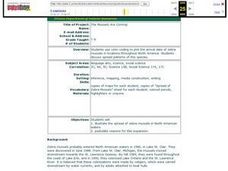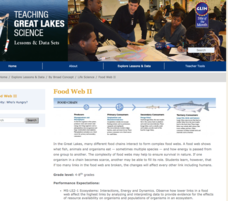Curated OER
National Marine Sanctuaries Fish
Information is provided on Gray's Reef, Florida Keys, and Flower Garden Banks marine sanctuaries. Young marine biologists then visit the FishBase and REEF databases to collect fish species information for each location. They then...
Curated OER
Is Purple Loosestrife a Problem in Our County?
Learners identify purple loosestrife and see where the local infestations are. In this plant species lesson students record their observations and complete an activity.
Curated OER
Discovering Water
Pupils examine how to conserve water. In this water conservation lesson students complete a water watching lab activity.
Syracuse University
Erie Canal
While canals are not the way to travel today, in the first half of the nineteenth century, they were sometimes the best way to move goods and people. Scholars examine primary sources, including maps and pictures, to investigate the role...
Curated OER
Fur Trading
Students take on a role such as a farming community, hunting community or a trading post. They decide which products they focus on and then trade with the other groups.
Curated OER
Angkor What? Angkor Wat!
Middle schoolers investigate one of the largest religious structures in the world, Angkor Wat, a temple in Cambodia. The temple's place in Southeast Asian history, its history and the migration of ideas of both Hinduism and Buddhism is...
Curated OER
The Mussels Are Coming
Learners work together to identify and describe the various types of mussels. Using a color-coded system, they plot the arrival date of zebra mussels in North American waters. They discuss the increase in their population with the class.
Scholastic
Perfect Postcards: Illinois
Connect the geography and history of Illinois using an art-centered lesson on the railroads. The railroad connected once-distant places, particularly in the Midwest. Using research, class members create postcards of fictional cross-state...
Scholastic
The Rise of Railroads: California
Railways are an integral part of the history of California. Using a timeline format, class members connect major historical events to the rise of the railroads and their impact on the state. Activities include a mix of independent and...
Scholastic
The Rise of Railroads: Illinois
Railways not only cross the US, but they are also intertwined with the history of America. Using a timeline format, individuals explore the connections between major events in American history—such as the Civil War—and the rise of the...
Curated OER
Aquatic Exotics
Students identify and describe the aquatic exotic species found in Illinois. Using the internet, they research the species origins and discover their effects on native species in the area. They discuss how appropriate it is to introduce...
Curated OER
Exploring the History of the I&M Canal
Learners examine the building of the I & M canal in Chicago. Using the internet, they research the lives of the individuals who worked on the construction and develop a timeline of events. They explore the impact of the canal on...
Curated OER
Biological Control of Purple Loosestrife
Students examine the role of Purple Loosestrife in Illinois and Indiana rivers. In groups, they collect a wide variety of plants in a wetland and raise beetles in a controlled environment. They introduce the loosestrife into the...
Curated OER
Impact of Exotic Species in an Environment
Young scholars explain the impact of exotic species in an environment. In this non-native species lesson students construct posters and dioramas showing environments before and after the invasion by an exotic(s).
Curated OER
Where Do All the Toxins Go?
Students demonstrate how chemicals accumulate in fish fat. They study path ways of toxins in the fish's body and ways to prepare fish to avoid consuming the toxins. They examine U.S. and Canada regulations to protect the environment.
Michigan Sea Grant
Wetlands
Wetlands may not sound particularly ornate, but they are as important as any habitat! With a hands-on activity, young scientists build a wetland model and observe its many functions in action. They discover the importance of wetlands to...
Michigan Sea Grant
Food Web II
A food web consists of complex food chains and the more complex the web, the better likelihood of survival. Learners compare and contrast food webs and food chains and discuss concepts like the predator-prey and consumer-producer...
Curated OER
Ducks in the Flow: Resources about Surface Ocean Currants for the Upper Elementary Classroom
Students investigate surface ocean currents. In this oceanography activity, students work in small groups to create models that demonstrate surface currents, the Coriolis Effect, and how surface currents move debris. This activity...
Curated OER
The Journey of the Pacific Salmon
Students examine the journey of the Pacific salmon. In this salmon species instructional activity, students review the stages of the salmon life cycle and conduct an experiment to determine how the water and habitat changes during each...
Curated OER
Getting a Sense of Time
Students gain an appreciation for geologic and historic time. They gain a general amount of information of the development of hte Chicago area, with particular attention given to the role of the Chicago River. Students contruct a time...
Curated OER
U.S. Geography: The Midwest
Students research agricultural products of the Midwest. In this Midwest lesson, students watch a video about the geography of the Midwest, discuss how topographical features were formed and review the agricultural products the Midwest...
Curated OER
US Geography: The Midwest
Students investigate the geography and agricultural products of the Midwestern United States. In this US geography lesson, students watch and discuss a video that depicts the Midwest of the US as the breadbasket of the country. They make...
Curated OER
Non Native Species: English Ivy-Landscape Plant or Deadly Killer?
High schoolers study the impact that invasive species have on biodiversity and more natural areas.

























